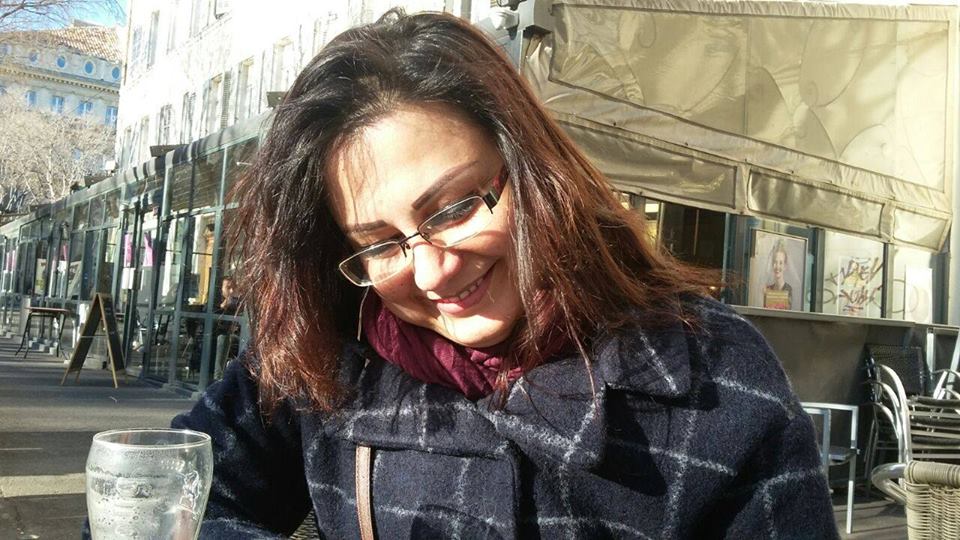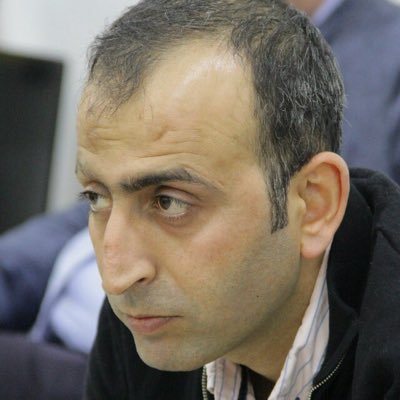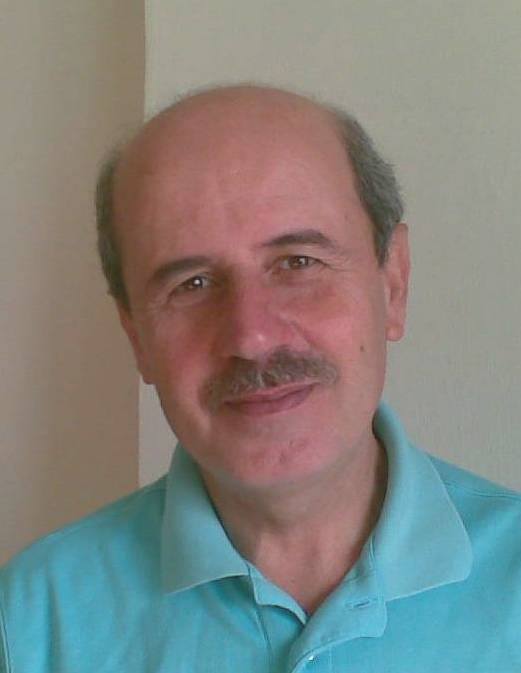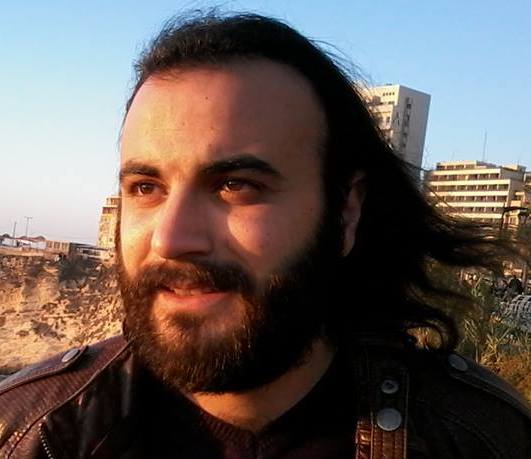Six years into the Syrian revolution, one can only say that the movement has changed drastically making it more complex and vague. During this time, the Syrian revolutionaries experienced many disappointments and setbacks but they still carry the hope of change within them. On the sixth anniversary of the revolution, SyriaUntold asked four Syrian intellectuals and artists who have been part of the revolution since its beginning to share their insights about the current situation.
Wael Saededdin: The Revolution Began Showing a Patriotic Movement
Wael Saededdin is a Syrian poet who has worked for several opposition media outlets. Formerly imprisoned for three years by the regime, Saededdin is firmly convinced that anyone who believes in the revolution but resides outside the country cannot be an effective member of change. For him, effective revolutionary work starts with the rebels in Syria and, because he is living abroad, his role is currently limited to being a supporter of the revolution.
He says: “The current situation in Syria can only be: to either be with or against the revolution. Since my position on the matter is already known, I have a patriotic duty that defines the nature of my work and a moral duty that keeps it on the [right] track. I have to look at this track as a critic who is afraid for its fragile, accumulative structure so as to avoid any mistakes […].”

“As regional and other world states realized the geopolitical importance of Syria, money was being pumped to the armed revolution, turning it into factions. The [revolution’s] mission changed from protecting demonstrators and our land and our honor to mostly being extremist Islamist factions with ties to regional powerbrokers and funders who have the final say, all the while delegitimizing the Syrian revolutionary arms.”
Saededdin added that the political opposition was unable to come up with a strong national stand, making a weak impression on the world political platform. However, he admitted that “decades of Fascist tyranny can only produce such an opposition.”
He concluded: “I think that, after many years and thanks to the patience of many of its strong [supporters], the revolution is now starting to show a patriotic movement, which sees the political failures of the opposition and the presence of [armed] factions merely as problematic by-products of the revolution that need to be solved, even if that happens at a later stage.”
Louise Abdel Karim: I Demand Justice Against Those Who Sold Illusions
Syrian actress Louise Abdel Karim shared with SyriaUntold how the revolution affected her personally and how it forever changed her life. “When my father was arrested [by the regime] in 2011, that was the end of my marital life. It was a life I wished to have until the end of my days, but opposing [political] views made it impossible.
“Like any woman, I dreamed of a loving family. As a wife, I didn’t lack for love or social status, but I didn’t have respect. My desire for justice for all with no one being above the law, either for being the son of an influential man or because s/he was famous, is what my husband - whom I married for love - couldn’t understand.”

She adds: “But what happened was that some hypocrites switched sides from being pro-regime to being pro-revolution [to make] personal gains and promises to political parties that have no relation to the future of Syria that I dream of.”
Abdel Karim concluded her talk with SyriaUntold, noting her losses. “I lost a dream I had wanted since my childhood. I lost my career and personal life, but my biggest loss was that of my peers who lied to themselves first and foremost and who played along without considering the repercussions of what they said or did. My dream of going back to Damascus is the beacon of light in my expatriation, and I still dream of justice against all those who lied and gave people illusions.”
Manhal Barish: We Must Change the Strategy of Military Resistance
Manhal Barish is a Syrian journalist who has also worked for the opposition's Syrian National Council and currently resides in Istanbul. During his interview with SyriaUntold, he focused on the military side of the revolution, saying: “[There were] consecutive defeats of the rebels, starting from Old Homs to Daraya, Muadamiyah, Aleppo, Wadi Barada, al-Waar neighborhood and finally the violent assault on al-Qabun in attempts to cut off Eastern Ghuta. The rebels’ military factions must revise and reassess their strategy to get to the reasons behind those defeats.”
Barish also told SyriaUntold that the concept of “liberated areas” has proven to be a catastrophe, saying that it only gave the Syrian regime an alibi to shell cities and civilians. That consequently aided in the loss of the popular support the rebels’ military factions used to enjoy, especially after these groups took up military headquarters within residential neighborhoods. It didn’t help that the factions suffered from internal fighting over scarce local resources and whatever government institutions were left behind by the regime.
Finally, the journalist explained that some of these factions also set up Sharia courts that answered to their own leaders in an attempt to create a new reality. This left each area isolated with different modes of control between villages and towns, depending on the ideology of each faction.

The journalist confirmed that reverting to the old ways of the rebels’ military work - as happened in the beginning of 2012 – is what is needed. Targeting military check points outside of the cities and raiding military barracks and airports present a good way to bleed the regime forces and its supporting factions, he said. “I’m not talking about popular resistance as some are promoting. That requires something else. I’m talking about changing the military resistance strategy to limit the loss of popular support for the revolution.”
Munir Shahhud: Change Is a Very Present Reality Now
Munir Shahhud is a Syrian author and former university academic. He used to teach anatomy in the universities of Aleppo, Homs and Latakia, until he was fired in 2006 for signing the Damascus Declaration.
Shahhud provided SyriaUntold with a brief analysis of the situation in Syria, saying that it started as a “righteous, popular, and spontaneous outburst” due to the lack of freedom of expression and the overbearing nature of the security apparatus.
However, he explained that having a right to revolt is not enough to ensure success without the presence of a national leadership that sets goals and clear ways to achieve these goals.
“It was not in the interest of those who helped the revolution to survive, the Gulf actors and others, for it to alter the reality. They merely supported the revolution in its capacity as a counter revolution, which only dimmed the hope many Syrians had in the beginning. This support not only led to oppression and sectarian incitement, but also turned into a civil war that then manifested as a regional and international conflict [whose fuel] was mainly the Syrians.”

The author said that the opposition figures who accepted external support played a catastrophic role and helped in igniting the civil war instead of being nationally responsible. One can say “it is one of the worst oppositions in the world,” he added.
Nevertheless, “change is a very present reality,” Shahhoud concluded. “Even if it’s dormant right now and even if the social changes are slow and sometimes misleading, but it is ongoing despite of the depth of the rift. In spite of the obstacles, a Syrian civil society has to emerge -- albeit slowly, mainly due to international agreements and arrangements.”
[Main picture: A demonstration in the city of Duma on the sixth anniversary of the Syrian revolution - 17-3-2017 - (Facebook page of media activist Youssef al-Bustani/Fair use. All rights reserved to the author)].




